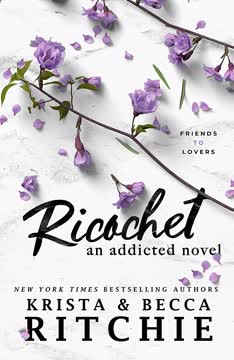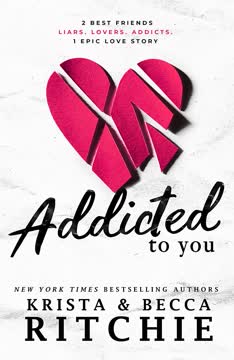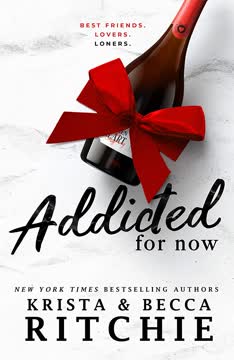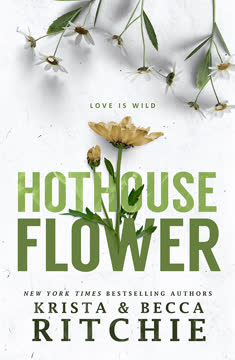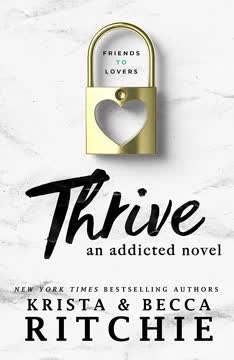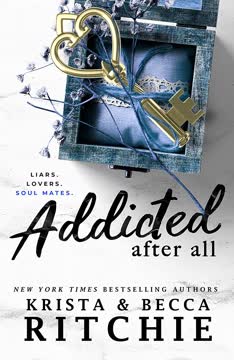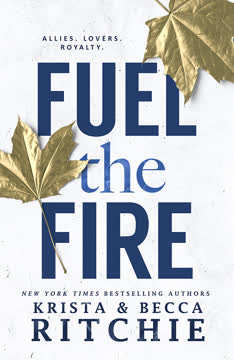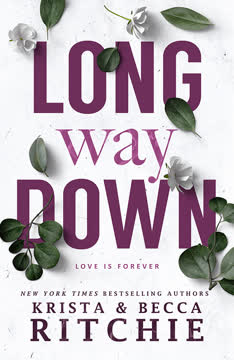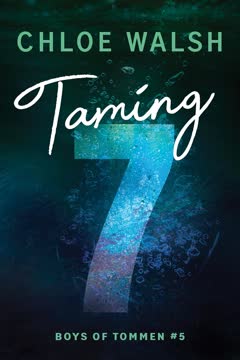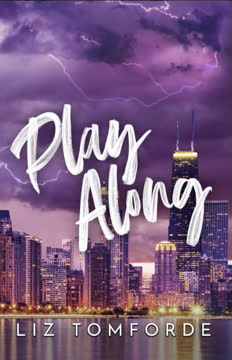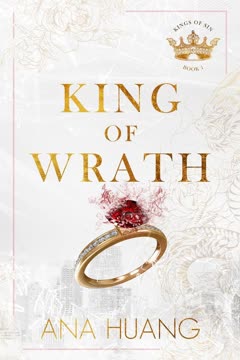Plot Summary
New Year's Without Lo
Lily Calloway, reeling from her boyfriend Loren "Lo" Hale's departure to rehab for alcoholism, tries to survive New Year's Eve without him. She's at a party with her younger sister Daisy, surrounded by beautiful people and sexual temptation. Lily's own addiction—sex—makes every moment a test of willpower. She's haunted by the fear that she'll betray Lo, and her co-dependency on him is painfully clear. The party is a minefield, and Lily's internal struggle is as loud as the music. She wants to be better, but she's not sure she can be without Lo by her side.
Sisterhood on the Edge
Daisy, eager to distract Lily from her pain, drags her to the roof for a heart-to-heart. They play a trust game, revealing secrets: Daisy's lost her virginity, and Lily promises to help her get birth control. The sisters' relationship deepens, but Lily's anxiety about her own addiction and Daisy's recklessness grows. Daisy's desire for freedom and risk-taking is a mirror to Lily's own struggles. Their bond is tested by honesty, and Lily realizes that being present for her family is a different kind of progress.
Temptations and Triggers
Back at the party, Daisy tries to set Lily up with a model, but Lily's cravings for sex—specifically with Lo—are overwhelming. She flees from temptation, but the environment is a constant trigger. Lily's mind is a battleground between her desire for Lo and her compulsion for sexual release. She's terrified of failing him and herself, and the absence of her usual coping mechanism—Lo—makes her feel exposed and raw.
Ryke's Reluctant Guardianship
Ryke Meadows, Lo's half-brother, enters the scene, tasked with watching over Lily in Lo's absence. Their relationship is tense; Ryke is blunt and unsympathetic, but he's determined to keep Lily from self-destruction. He's also keeping an eye on Daisy, who's teetering between adolescence and adulthood. Ryke's presence is both a comfort and a challenge, forcing Lily to confront her own weaknesses and the reality of her addiction.
Family, Fears, and Fizz
At a Fizzle company event, Lily and her sisters are forced into awkward social situations by their controlling mother. Old enemies resurface, and Lily is reminded of her past and the ways her family fails to understand her struggles. Rose, the eldest sister, clashes with their mother in a dramatic confrontation, revealing the deep scars of their upbringing. The family's dysfunction is on full display, and Lily feels both isolated and desperate for connection.
The Party's Dark Turn
The night takes a dark turn when Daisy is drugged at the party. Ryke and Lily rush her to the hospital, navigating chaos and fear. The incident is a wake-up call for Lily, highlighting the dangers that lurk in her world and the importance of vigilance and support. The sisters' bond is strengthened by crisis, and Ryke's role as protector becomes more pronounced.
Withdrawal and Self-Discovery
With Lo gone, Lily's withdrawal from sex is brutal. She tries to fill the void with porn and masturbation, but nothing satisfies her. Her attempts at self-control are met with frustration and shame. Lily's journey is marked by small victories and painful setbacks, and she begins to realize that her addiction is more complex than she thought. The absence of Lo forces her to confront the roots of her compulsion.
Therapy and Truths
Encouraged by Rose, Lily starts seeing Dr. Banning, a therapist specializing in sex addiction. The sessions are uncomfortable but illuminating. Lily unpacks her childhood, her relationship with her parents, and the origins of her addiction. She learns that her compulsions are tied to feelings of neglect and inadequacy, and that recovery will require honesty, boundaries, and support. Therapy becomes a lifeline, offering hope for change.
Daisy's Daring Dive
During Daisy's birthday trip to Mexico, she disappears and is found preparing to cliff-dive with local daredevils. Ryke climbs the cliff to stop her, but Daisy jumps anyway, with Ryke following to ensure her safety. The incident exposes Daisy's need for thrill and attention, and Lily's fear for her sister's life. The family's patterns of risk and rescue are laid bare, and Lily sees the parallels between her own addiction and Daisy's behavior.
The Limits of Love
As Lo's return from rehab approaches, Lily grapples with the boundaries of their relationship. They agree that enabling each other is no longer an option; they must help each other heal. Lily's therapist gives her an envelope of sexual limits, to be managed by Lo. The couple's love is tested by the need for restraint and honesty. They must learn to be together without falling back into old patterns.
Vows in the Snow
Rose organizes a "Lily Vow Day," where Lily burns her porn and reads vows to abstain from compulsive sex, porn, and cheating. Supported by Rose, Connor, and Ryke, Lily makes a public commitment to her recovery. The ritual is both empowering and humbling, marking a turning point in her journey. Ryke apologizes for doubting her, and Lily feels the strength of her chosen family.
The Envelope of Rules
Dr. Banning gives Lily an envelope containing her sexual limits, advising her to let Lo enforce them. The idea of surrendering control is terrifying, but necessary. Lily is forced to trust Lo and accept that recovery means living with boundaries. The envelope becomes a symbol of both hope and fear, representing the unknown future of their relationship.
Reunion and Restraint
Lo returns from rehab, and their reunion is charged with longing and anxiety. They must navigate new rules: Lo is in control of their sexual boundaries, and Lily must resist her compulsions. Their first night together is slow and deliberate, focused on intimacy rather than indulgence. The challenge of balancing love and addiction is daunting, but they are determined to face it together.
The Price of Secrets
Just as Lily and Lo begin to settle into their new life, they receive a threatening message: someone knows Lily's secret and is prepared to sell it to the tabloids. The fear of public shame and family disappointment looms large. Lo promises to protect her, but their resources are limited. The cost of secrecy becomes painfully clear, and Lily must confront the possibility of her addiction being exposed to the world.
Healing, Hope, and Homecoming
Despite the threats and challenges, Lily and Lo find solace in each other and their support system. Therapy, honesty, and boundaries become the foundation of their recovery. The journey is ongoing, marked by setbacks and small victories. Lily learns that healing is not about perfection, but about persistence and hope. Together, they face the future—uncertain, but united.
Characters
Lily Calloway
Lily is the protagonist, a young woman battling sex addiction and deep-seated feelings of inadequacy. Her relationship with Lo is both her greatest comfort and her biggest challenge, as their co-dependency threatens to undermine their recovery. Lily's journey is one of self-discovery, learning to set boundaries, accept help, and find worth beyond her compulsions. Her relationships with her sisters, especially Rose and Daisy, are sources of both pain and healing. Lily's psychological landscape is marked by shame, longing, and a desperate hope for change.
Loren "Lo" Hale
Lo is Lily's boyfriend and best friend, struggling with alcoholism. His love for Lily is fierce, but their mutual enabling has kept them both trapped in addiction. Lo's time in rehab forces him to confront his own demons and the ways he's hurt Lily. Upon returning, he takes on the role of boundary-setter, determined to help Lily heal without falling back into old patterns. Lo's development is defined by his willingness to change, his vulnerability, and his unwavering commitment to Lily.
Rose Calloway
Rose is Lily's older sister, a force of nature who takes charge of Lily's recovery. She's fiercely intelligent, often intimidating, and struggles with her own issues of control and vulnerability. Rose's relationship with Connor is a battleground of intellect and emotion, and her dynamic with Lily is both nurturing and challenging. Rose's psychoanalysis reveals a fear of weakness and a deep need to protect her family, even at the cost of her own happiness.
Ryke Meadows
Ryke is Lo's half-brother, reluctantly drawn into the role of Lily's guardian during Lo's absence. He's abrasive and honest to a fault, but his actions reveal a deep sense of responsibility. Ryke's relationship with Daisy is complicated by age and attraction, and his dynamic with Lily is a mix of antagonism and support. Psychologically, Ryke is driven by a need to prove himself and to atone for past mistakes, often through acts of protection and sacrifice.
Daisy Calloway
Daisy is the youngest Calloway sister, a model with a penchant for risk-taking. Her desire for freedom and thrill mirrors Lily's own compulsions, and her relationship with Ryke is charged with tension and unspoken longing. Daisy's development is marked by her struggle to assert independence while navigating the dangers of her world. She craves connection but often seeks it through reckless acts.
Connor Cobalt
Connor is Rose's boyfriend, a genius with a dry wit and a calm demeanor. He provides stability and insight, often acting as a mediator in the family's conflicts. Connor's relationship with Rose is a dance of equals, and his friendship with Lily is marked by empathy and encouragement. Psychologically, Connor is driven by a desire for understanding and mastery, but he's learning to value vulnerability and connection.
Samantha Calloway
The Calloway matriarch, Samantha exerts control over her daughters' lives, often causing more harm than good. Her inability to accept her children as they are leads to conflict and resentment, especially with Rose and Lily. Samantha's actions are rooted in her own fears and disappointments, and her relationship with her daughters is a source of both pain and motivation for their growth.
Jonathan Hale
Lo's father, Jonathan is a powerful figure whose approval and criticism shape Lo's self-worth. His relationship with Lo is fraught with expectation and disappointment, and his rare moments of support are often overshadowed by his harshness. Jonathan's psychological makeup is defined by pride, regret, and a complicated love for his son.
Poppy Calloway
The eldest Calloway sister, Poppy is married with a child and often serves as the family's peacemaker. She's less involved in the central drama but provides a model of stability and acceptance. Poppy's role is to remind her sisters of the possibility of a different, quieter kind of happiness.
Dr. Banning
Lily's therapist, Dr. Banning is a steady presence who helps Lily unpack the roots of her addiction and set boundaries for recovery. She encourages honesty, self-compassion, and the acceptance of pain as part of healing. Dr. Banning's influence is crucial in Lily's journey toward self-understanding and change.
Plot Devices
Dual Addictions and Co-Dependency
The narrative is structured around the parallel journeys of Lily and Lo as they confront their respective addictions. Their relationship is both a source of strength and a trap, as their mutual enabling keeps them from healing. The story uses their dynamic to explore the complexities of love, addiction, and recovery, highlighting the need for boundaries, honesty, and support.
Therapy as a Narrative Catalyst
Therapy sessions with Dr. Banning serve as a vehicle for introspection and revelation. Through these sessions, Lily confronts her childhood, her family dynamics, and the origins of her addiction. The therapist's guidance provides structure and hope, while the envelope of sexual limits becomes a tangible symbol of the challenges ahead.
Family Dysfunction and Sibling Bonds
The Calloway family's dysfunction is a backdrop for the characters' struggles. The sisters' relationships are fraught with competition, misunderstanding, and love. Family events and confrontations serve as crucibles for growth, forcing the characters to confront old wounds and forge new connections.
Foreshadowing and Symbolism
Key events—New Year's Eve, Daisy's birthday, the Fizzle party, Lily's vow-burning—are used to foreshadow turning points and symbolize internal change. The threat of Lily's secret being exposed to the tabloids adds suspense and underscores the stakes of recovery and honesty.
Slow-Burn Romance and Sexual Tension
The narrative structure emphasizes the slow rebuilding of Lily and Lo's relationship, focusing on emotional intimacy and the challenge of setting sexual boundaries. Their reunion is marked by restraint and longing, highlighting the difficulty and necessity of change.
Analysis
Ricochet is a raw, unflinching exploration of addiction, co-dependency, and the messy, nonlinear path to healing. Through Lily's candid narration, the novel dismantles the glamorization of both sex and substance abuse, revealing the pain, shame, and isolation that often accompany them. The story's power lies in its willingness to confront uncomfortable truths: that love can be both a lifeline and a liability, that family can wound as much as it heals, and that recovery is not about erasing desire but learning to live with it. In a culture that often stigmatizes female sexuality and addiction, Ricochet offers a nuanced, compassionate portrait of a young woman fighting for agency, connection, and self-worth. The novel's ultimate message is one of hope: that with honesty, boundaries, and support, even the most broken relationships—and people—can begin to mend.
Last updated:
FAQ
```markdown
Synopsis & Basic Details
What is Ricochet about?
- A Journey of Recovery: Ricochet delves into Lily Calloway's struggle with sex addiction as her boyfriend, Loren "Lo" Hale, enters rehab for alcoholism, forcing her to confront her own compulsions and co-dependency. The narrative follows Lily through three months of intense self-discovery, therapy, and the challenging process of establishing healthy boundaries in her life and relationships.
- Navigating Family Dynamics: The story explores the complex and often dysfunctional Calloway family, particularly Lily's relationships with her sisters, Rose and Daisy, and their controlling mother. These interactions highlight themes of neglect, protection, and the search for individual identity amidst familial expectations.
- Redefining Love and Intimacy: At its core, Ricochet is a poignant exploration of how Lily and Lo, deeply intertwined by their addictions, strive to rebuild their relationship on a foundation of honesty, mutual support, and healthy limits, rather than enabling each other's destructive patterns. It's a raw look at the difficult path to true intimacy.
Why should I read Ricochet?
- Raw, Unflinching Honesty: Readers seeking a deeply emotional and honest portrayal of addiction, particularly female sex addiction, will find Ricochet compelling. Lily's internal monologue is candid, revealing the shame, cravings, and psychological toll of her struggle, offering a rare and empathetic perspective.
- Complex Character Development: The novel excels in showcasing the intricate growth of its characters, especially Lily and Lo, as they navigate recovery. Their journey is messy and realistic, highlighting the challenges of breaking old habits and forging new, healthier ways of relating to themselves and each other.
- Rich Interpersonal Dynamics: Beyond the central romance, the book offers a fascinating look at sibling bonds, strained parent-child relationships, and unexpected alliances (like Lily and Ryke). These connections provide both conflict and crucial support, enriching the narrative with layers of loyalty, frustration, and evolving understanding.
What is the background of Ricochet?
- Companion to a Series: Ricochet is a companion novel (specifically Addicted #1.5) within the "Addicted" series, bridging the gap between Addicted to You and Addicted for Now. It provides crucial insight into Lily's perspective and her personal battle with sex addiction, which was less explored in the first book, offering a deeper understanding of her character's motivations and struggles.
- Focus on Addiction Recovery: The book is set against the backdrop of contemporary addiction recovery, with Lo in rehab for alcoholism and Lily beginning therapy for sex addiction. This context allows for an exploration of the psychological and emotional challenges of sobriety and celibacy, as well as the societal stigmas surrounding these issues.
- Affluent East Coast Setting: The story primarily takes place in the privileged world of the Calloway and Hale families, with settings ranging from Upper East Side parties to Princeton, New Jersey, and a luxury yacht in Mexico. This backdrop subtly highlights how wealth and social status do not insulate individuals from personal struggles and family dysfunction.
What are the most memorable quotes in Ricochet?
- "I want to love Lo without people telling me that our love is too much.": This quote, early in the novel, encapsulates Lily's core desire for acceptance and validation of her intense, co-dependent love for Lo, setting the stage for her journey to define their relationship on their own terms. It highlights the external judgment and internal conflict surrounding their bond, a central theme in Ricochet analysis.
- "Giving something up isn't the same thing as losing control. It's the opposite, Lily. You're taking back control.": Dr. Banning's profound insight offers Lily a new perspective on her recovery, reframing abstinence not as a punishment but as an act of empowerment. This quote is a pivotal moment in Lily Calloway's psychological journey, emphasizing agency in overcoming addiction.
- "You don't make me miserable. You make me want to live. And I want to live with you.": Lo's heartfelt confession to Lily over the phone is a powerful declaration of his love and commitment, directly countering her fears of being a burden. This quote underscores the deep emotional connection and mutual support that forms the bedrock of their relationship, even amidst their individual struggles, a key aspect of Loren Hale's motivations.
What writing style, narrative choices, and literary techniques does Krista Ritchie use?
- First-Person, Introspective POV: The novel is told entirely from Lily Calloway's first-person perspective, immersing readers deeply in her internal struggles, anxieties, and raw emotional landscape. This narrative choice allows for an intimate exploration of her sex addiction and co-dependency, making her psychological complexities palpable.
- Stream-of-Consciousness & Internal Monologue: Ritchie frequently employs stream-of-consciousness, particularly during Lily's moments of intense craving or emotional distress. Her thoughts often jump, repeat, and contradict, effectively conveying the chaotic and overwhelming nature of her addiction and anxiety, a key element in Ricochet analysis.
- Dialogue-Driven & Emotional Pacing: The narrative relies heavily on dialogue, often sharp and witty, to reveal character dynamics and advance the plot, especially in the interactions between the Calloway sisters and with Ryke and Connor. The pacing fluctuates between rapid, anxious internal monologues and slower, more deliberate emotional confrontations, mirroring Lily's fluctuating mental state.
Hidden Details & Subtle Connections
What are some minor details that add significant meaning?
- Lily's Dinosaur Slippers: Her choice to wear "dinosaur slippers and long johns" to Lo's house (3 ½ years ago chapter) when they're supposed to be "dating" for his father, subtly highlights Lily's deep-seated comfort and authenticity with Lo, contrasting with the "fake" nature of their initial relationship. It symbolizes her childlike innocence and vulnerability, which Lo cherishes, even as she navigates adult complexities.
- The "Lily-Scented" Business Cards: Rose's business cards being "lily-scented" (Chapter 6) is a small detail that reveals the subtle, often unwanted, influence of their mother, Samantha Calloway, even in Rose's independent ventures. It underscores the pervasive nature of their mother's control and the sisters' struggle for true autonomy, a recurring theme in themes in Ricochet.
- Ryke's Rock Climbing History: Ryke's revelation about free solo climbing Half Dome and El Capitan (Chapter 8) is more than just a character quirk; it foreshadows his fearless, impulsive nature and his ability to remain calm in extreme danger, which becomes crucial when he rescues Daisy from the cliff dive. It also subtly connects to his "different kind of damaged" philosophy, where he confronts danger head-on rather than through verbal manipulation like Lo.
What are some subtle foreshadowing and callbacks?
- Daisy's "Freefalling" Desire: Daisy's declaration that "freefalling" is better than sex (Chapter 8) subtly foreshadows her reckless cliff-diving stunt in Mexico. This seemingly throwaway line reveals her deep-seated craving for intense experiences and a sense of freedom, mirroring Lily's own pursuit of highs through sex, highlighting parallel character arcs in Ricochet.
- Lo's "Sick Fuck" Label: Jonathan Hale's harsh comment to Lo, "Don't be such a sick fuck" (3 ½ years ago chapter), is a painful callback to Lo's internal struggles and his father's judgmental nature. This early interaction foreshadows Lo's deep-seated insecurities and the complex, often damaging, relationship with his father that fuels his alcoholism, a key aspect of Loren Hale's motivations.
- Lily's "Divorce" Metaphor: Lily's internal thought, "Couples who divorce usually don't get remarried" (Chapter 10), when discussing her separation from Lo, subtly foreshadows the profound emotional rebuilding required for their relationship. It's a callback to their shared history and the depth of their bond, emphasizing that their separation is akin to a marital split, requiring a conscious "remarriage" of their commitment.
What are some unexpected character connections?
- Jonathan Hale's Protective Instincts: Jonathan Hale, often portrayed as cold and demanding, unexpectedly steps in to protect Lily from Aaron Wells at the Fizzle event (Chapter 4). His declaration, "That girl is practically my daughter-in-law," reveals a surprising, albeit complex, paternal affection for Lily, challenging the reader's initial perception of him and hinting at his deeper, flawed love for Lo.
- Ryke and Daisy's Shared Impulsivity: Despite their age difference, Ryke and Daisy share a striking impulsivity and a need for extreme experiences, as seen in Daisy's cliff dive and Ryke's free solo climbing. This unexpected connection, though not romantic, highlights a shared "wildness" that sets them apart from the more controlled Calloway sisters, creating a unique dynamic in Ricochet character development.
- Connor's Empathy for Lily's Shame: Connor Cobalt, known for his intellect and sometimes detached demeanor, shows surprising empathy for Lily's embarrassment during her therapy journey (Chapter 2). His presence during Rose's "therapist interviews" and his understanding of Lily's social anxiety reveal a deeper, supportive connection that goes beyond his relationship with Rose, offering a nuanced view of Connor Cobalt's character.
Who are the most significant supporting characters?
- Dr. Banning, The Compassionate Guide: Dr. Banning is more than just a therapist; she is Lily's anchor and a catalyst for profound self-discovery. Her patient, non-judgmental approach helps Lily unpack deep-seated trauma and reframe her addiction, providing the crucial external validation and guidance Lily desperately needs. Her role is central to Lily Calloway's recovery analysis.
- Aaron Wells, The Lingering Threat: Aaron Wells serves as a tangible representation of Lily's past fears and the external judgment she constantly battles. His reappearance and threats ("I will ruin you the way Loren ruined me") not only add suspense but also force Lily to confront her vulnerabilities and the potential public exposure of her addiction, highlighting the high stakes of her journey.
- Nola, The Silent Confidante: Nola, the Calloway family driver, is a subtle but significant presence. She often witnesses Lily's most vulnerable moments (like her anxiety before Lo's return) and provides a quiet, non-judgmental support system. Her consistent presence symbolizes a stable, albeit professional, constant in Lily's often chaotic life, offering a sense of security without intrusion.
Psychological, Emotional, & Relational Analysis
What are some unspoken motivations of the characters?
- Lily's Quest for Worthiness: Beneath her sex addiction, Lily's unspoken motivation is a desperate search for worthiness and validation, stemming from perceived parental neglect. Her confession, "I never felt like she loved me... I never felt worthy enough" (Chapter 12), reveals that her compulsions are a coping mechanism to fill an emotional void, a core aspect of Lily Calloway's motivations.
- Rose's Fear of Vulnerability: Rose's controlling nature and fierce independence are subtly motivated by a deep-seated fear of vulnerability and a desire to avoid her mother's perceived weaknesses. Her dramatic breakup with Connor and her reluctance to admit her feelings (Chapter 3) stem from a need to maintain control, even at the cost of emotional intimacy, a key insight into Rose Calloway's psychological complexities.
- Ryke's Need for Redemption: Ryke's bluntness and protective actions, especially towards Lily and Daisy, are driven by an unspoken need for redemption and to atone for his past inaction regarding Lo's struggles. His commitment to "make sure you didn't jump off a cliff when he left" (Chapter 1) reveals a deep sense of responsibility and a desire to be a reliable figure, contrasting with his earlier perceived abandonment of Lo.
What psychological complexities do the characters exhibit?
- Lily's Shame-Addiction Cycle: Lily exhibits a complex shame-addiction cycle, where feelings of worthlessness and guilt fuel her compulsive sexual behaviors, which in turn intensify her shame. Her internal struggle to reconcile her desire for connection with her self-perceived "dirty" nature is a central psychological battle, making Ricochet analysis of her character particularly poignant.
- Lo's Self-Punishment & Control: Lo's alcoholism is intertwined with a psychological need for self-punishment and a struggle for control, particularly in response to his father's harshness. His decision to enforce Lily's sexual limits (Chapter 12) is a complex act, reflecting both his love and his own need to exert control in a healthy way, a significant aspect of Loren Hale's character development.
- Daisy's Reckless Search for Identity: Daisy's daring acts, like cliff diving and confronting bullies, reveal a psychological complexity rooted in a restless search for identity and attention, especially as the youngest Calloway sister. Her impulsivity is a coping mechanism against feeling "trapped" by her mother's expectations and the shadows of her older sisters, showcasing Daisy Calloway's motivations.
What are the major emotional turning points?
- Lily's Rooftop Confession with Daisy: The intimate conversation on the rooftop where Daisy confesses losing her virginity (Chapter 2) is a major emotional turning point for Lily. It forces her to step outside her own addiction, fostering a deeper, more protective bond with her sister and realizing that being present for her family is a form of progress, shifting her focus from self-absorption.
- Rose's Confrontation with Her Mother: Rose's explosive argument with her mother at the Fizzle event, culminating in a slap (Chapter 4), is a profound emotional turning point for Rose. It shatters her composed facade, revealing years of suppressed anger and hurt, and ultimately leads to her allowing Connor to comfort her, signifying a rare moment of vulnerability and a shift in her relationship dynamics.
- Lily's Bathtub Breakdown & Lo's Call: Lily's emotional collapse in the bathtub on the yacht (Chapter 8), followed by Ryke calling Dr. Banning and then Lo, marks a critical turning point. This raw vulnerability forces her to admit her inability to control her compulsions and leads to Lo's pivotal phone call, where they commit to a new, honest path for their relationship, solidifying Ricochet themes of mutual support.
How do relationship dynamics evolve?
- Lily and Lo: From Enabling to Empowering: Their relationship evolves from a co-dependent dynamic where they enabled each other's addictions to one focused on mutual empowerment and healthy boundaries. Lo's return from rehab and his role in enforcing Lily's sexual limits (Chapter 12) signifies a conscious shift towards a more mature, supportive partnership, redefining co-dependency in Ricochet.
- Rose and Connor: From Intellectual Sparring to Emotional Intimacy: Their dynamic transforms from constant intellectual sparring and on-again, off-again breakups to a deeper emotional intimacy. Rose's vulnerability after her mother's slap (Chapter 4) allows Connor to offer genuine comfort, moving their relationship beyond mental games to a foundation of shared emotional support, a key aspect of Rose Calloway's relationship analysis.
- Lily and Ryke: From Antagonism to Alliance: Initially marked by tension and blunt honesty, Lily and Ryke's relationship evolves into a reluctant but steadfast alliance. Ryke's consistent protection of Lily and Daisy, culminating in his apology for doubting Lily's strength (Chapter 11), forges a bond of mutual respect and understanding, highlighting unexpected character connections in Ricochet.
Interpretation & Debate
Which parts of the story remain ambiguous or open-ended?
- The Long-Term Success of Lily's Celibacy: While Lily achieves 90 days of celibacy and commits to new boundaries, the story leaves the long-term success of her "no self-love" rule somewhat open-ended. Her internal struggle and the lingering urges (Chapter 8) suggest that this will be an ongoing battle, prompting readers to question the sustainability of such strict limits in Ricochet analysis of recovery.
- Jonathan Hale's True Intentions: Jonathan Hale's character remains ambiguous. While he protects Lily from Aaron (Chapter 4) and expresses a complex love for Lo, his deep-seated issues and the impact of his "sick fuck" comment on Lo are not fully resolved. Readers are left to debate whether his actions stem from genuine care or a desire to maintain family appearances and control, adding depth to Jonathan Hale's motivations.
- The Future of Daisy and Ryke's Relationship: The intense, almost flirtatious, dynamic between Daisy and Ryke, despite their age difference and Ryke's initial discomfort (Chapter 8), leaves their future relationship open to interpretation. While Ryke maintains boundaries, the underlying tension and their shared "wildness" suggest a potential, albeit complicated, connection that could develop later in the series, sparking Ricochet character debates.
What are some debatable, controversial scenes or moments in Ricochet?
- Lo's "Phone Sex" Strategy: Lo's decision to engage in "phone sex" with Lily as a controlled outlet for her compulsions (Chapter 10), and his subsequent anger when she continues to masturbate after their session, is highly debatable. Some readers might view it as a progressive, boundary-setting approach, while others might see it as a form of enabling or an unhealthy power dynamic, sparking discussions on Ricochet themes of addiction management.
- Ryke's Confrontation with Daisy about Sex: Ryke's blunt and somewhat aggressive questioning of Daisy about her first sexual experience (Chapter 8), including his assertion that "whoever fucked you didn't do it right," is controversial. While intended to protect her, his method could be seen as shaming or inappropriate, raising questions about the ethics of his intervention and the boundaries of his guardianship.
- Lily's Mother's "Backup Plan" for Lo: Samantha Calloway's statement about creating a "backup plan" for Lily in case Lo "never returns" from rehab (Chapter 4) is a controversial moment. It highlights the mother's lack of faith in Lo's recovery and her controlling nature, but also her misguided attempt to protect Lily, prompting debate on the nature of parental love and interference in family dysfunction in Ricochet.
Ricochet Ending Explained: How It Ends & What It Means
- A Fragile Homecoming and New Beginnings: Ricochet ends with Lo's return from rehab and his reunion with Lily, marking the beginning of their new, healthier relationship built on honesty and boundaries. Their first sexual encounter is slow and deliberate, emphasizing intimacy over compulsion, symbolizing their commitment to a different path. This ending signifies a hopeful, yet fragile, new chapter in Lily and Lo's relationship analysis.
- The Threat of Exposure and Ongoing Struggle: The final scene reveals a text message threatening to expose Lily's sex addiction to the tabloids, introducing a new external conflict. This ending means that while Lily and Lo have made significant internal progress, their journey is far from over. It underscores that recovery is an ongoing process, not a destination, and that external pressures will continue to test their resolve and their commitment
Review Summary
Ricochet receives generally positive reviews, with readers praising the character development, emotional depth, and realistic portrayal of addiction recovery. Many appreciate the focus on Lily's growth and her relationship with Lo. Some readers express discomfort with the age gap between certain characters. The writing style and dialogue receive mixed reactions. Overall, fans of the series find it addictive and eagerly anticipate future books, while some critics find certain aspects problematic or unrealistic.
Addicted World Series
Similar Books
Download PDF
Download EPUB
.epub digital book format is ideal for reading ebooks on phones, tablets, and e-readers.
